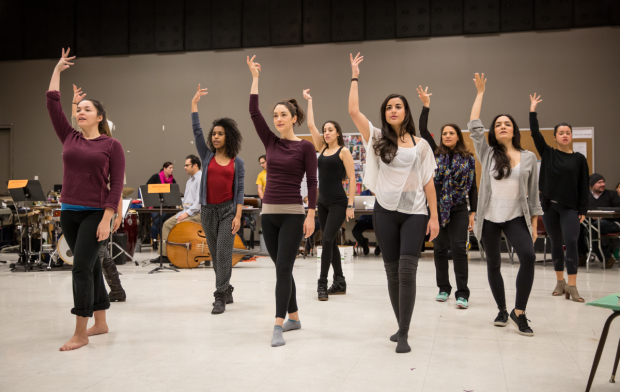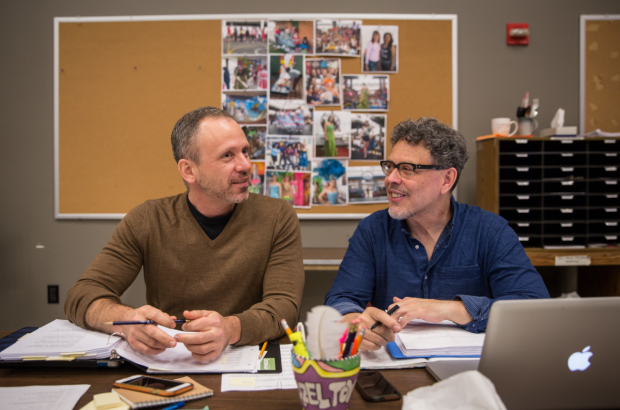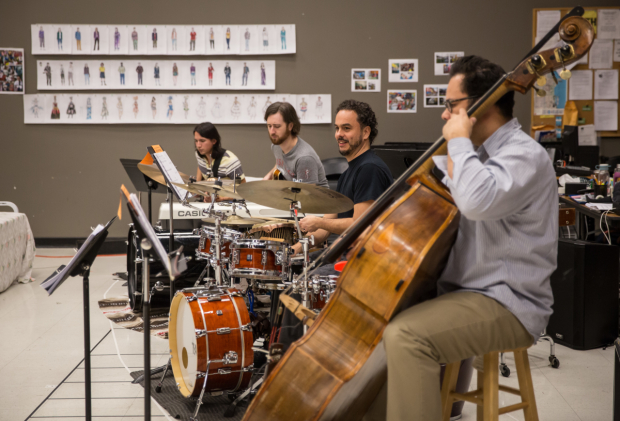José Rivera and Steve Cosson Go Inside Colombia's Unlikeliest Beauty Pageant
With the help of Grammy winner Héctor Buitrago, ”Another Word for Beauty” tells the stories of inmates at a Bogotá women’s prison.

(© Liz Lauren)
Another Word for Beauty is unique among shows created by New York-based investigative musical theater company the Civilians: It's premiering at Chicago's Goodman Theatre rather than their usual downtown NYC locations, it's the organization's first show based on an international topic, and playwright José Rivera's script is more fictionalized than the company's typical docudrama-style pieces. But then, the beauty pageant that serves as the basis for this new play isn't your average competition either: Its participants are inmates at El Buen Pastor women's prison in Bogotá, Colombia, and its dedicated to the Virgin Mary.
"The patron saint of the prison is the Virgin of Mercy," Oscar nominee José Rivera (The Motorcycle Diaries) told TheaterMania. "Legend has it that the Virgin Mary once appeared in the prison with her arms chained and her legs chained and she said, 'I'm here to give solace to all women who are prisoners.' And so in the month of September, the prison celebrates the Virgin of Mercy. And the climax of the celebration is the beauty pageant."
If the average pageant is rife with dissonance regarding representations of women, this one, which is designed to stress virtues like "solidarity, community-building, and responsibility," takes the contradictions of the Madonna-whore dichotomy even further. Playwright Rivera and director Steve Cosson (the Civilians' founding artistic director) traveled to Colombia to witness the contest and hear the inmates' stories firsthand.

(© Liz Lauren)
Why did you choose this particular project?
Steve Cosson: There is a very strong relationship between the U.S. and Colombia. There were many women that we met who were in jail for small drug crimes directly…because of the United States. Because of the war on drugs, the U.S. compelled Colombia to adopt laws that are similar to our drug laws — that, in our country, are responsible for the mass incarceration that happens in America.
José Rivera: It has all the things that I'm attracted to. It's about Latin America. It's about people who don't have any voice or power to get their voice out there. It’s a real human story of suffering and tragedy and redemption.
Tell me about the pageant and your experiences attending.
José: [Steve] stayed a month and I was there for two weeks and we both were there at the time of the pageant, [which is] a long event with dancing and different contests. For instance all the cell blocks create their own floats and it's a contest [for] who has the best float. That's a day. And they have a contest for the older women, they call them the madres, the mothers, so they compete and that's the second day. And the final day, the younger women compete for the beauty pageant. The way it's set up, there are like nine cell blocks and by the end, three of them will have won something.
Steve: It's a very diverse culture, the different regions of Colombia are very distinct and every region has its own sort of folkloric tradition and its dance tradition and then you have the national women's prison and you've got women from all over the country. So you have, in a sense, all these wonderful different cultural traditions represented there in the population of the prison.
What structure does your play take?
José: I invented more than the typical Civilians play. I think the most important thing for me is to give flesh and blood reality to people who are far away and distant from most American concerns. It's very easy to stick to the one-dimensional labels, and my hope is to completely explode the labels and reveal the flesh and blood and soul of each of the women in the play and to really make it impossible to walk away from the play with your prejudices still intact.
And it is more of a play with music as opposed to a traditional musical. One of the first persons that Steve reached out to was a man named Héctor Buitrago, [who] is a big musical presence in Colombia. So he brings his knowledge of traditional Colombian musical forms like cumbia and salsa and brings his own aesthetic. The songs really set the mood and give us a sense of place. They're all in Spanish; there'll be supertitles. But they don't do the normal work of a musical number. They go deeper into the characters and deeper into the community of women.

(© Liz Lauren)
How do you deal with this being an event that ascribes value to women based on the way they look?
José: We deal with it pretty head on. There are some women for whom their bodies are the most important thing they have. They don't have anything else. They have no property. They have no power. Their power comes from their beauty and their bodies. Some women revel in that in the play, which I think is accurate, and some women question it. There's a line where someone says, "All this pageant does is reduce women to their cleavage and ass cracks." So there's pushback against what the pageant even means. But, ultimately the strength of the pageant isn't necessarily winning and losing. It's the unifying effect it has on women who have to work together for a common goal.
Some women in their interviews express the fact that they feel free for the first time during the pageant. They don't feel like prisoners. And they're valued. There's one woman who said, like, "I was never at the center of attention, not even when I was sentenced. My family didn't care." And she was one of the winners. She said she felt the love of a thousand women in the prison the day she was crowned.










